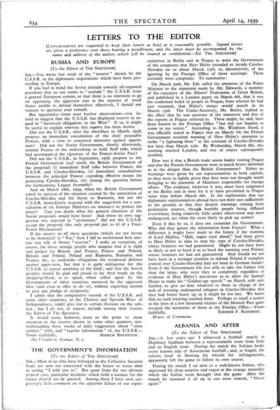THE GOVERNMENT'S INFORMATION
[To the Editor of THE SPECTATOR] SIR, Most of us who have belonged to the Collective Security front are now too concerned with the future to waste time in crying " I told you so." But apart from the too obvious general case, particular incidents which hold a menace for the future should not be ignored. Among these I have seen sur- prisingly little comment on the apparent failure of our repre-
sentatives in Berlin and in Prague to warn the Government of the symptoms that Herr Hitler intended to invade Czecho- Slovakia on or about March' 15th, or, alternatively, of the ignoring by the Foreign Office of these warnings. There certainly were symptoms. To summarise: On March zoth, Mr. Ede called the attention of the Prime Minister to the statement made by Mr. Edwards, a member of the executive of the Miners' Federation of Great Britain, and published in a London paper on March 6th, that it was the confirmed belief of people in Prague, from whence he had just returned, that Hitler's troops would march in on March 15th. The Under-Secretary, Mr. Butler, replied to the effect that he was unaware of the statement and also of the reports in Prague referred to. These might, he said, have been known to the Foreign Office " but did not happen to come to my notice." According to Mr. Wickham Steed, it was officially stated in France that on March 7th the French Government received warning of Herr Hitler's intention to strike " a lightning blow " at the remnant of Czecho-Slovakia not later than March 15th. By Wednesday, March 8th, this warning reached London, and was of course subsequently justified.
How was it that a British trade union leader visiting Prague and also the French Government were so much better informed as to the danger than the British Government? Either no warnings were given by our representatives in both capitals, or they were so lightly given that they were not thought worth bringing to the attention of Ministers responsible for foreign affairs. The evidence, whatever it was, must have originated at the Berlin end in time for it to have percolated to Prague some time before March 6th. Is the explanation that our diplomatic representatives abroad have not their ears sufficiently to the ground, or that they despise warnings coming from proletarian sources, though humble people being diffused everywhere, being relatively little under observation and most endangered, are often the most likely to pick up scents?
Even if this be so, it does not exonerate the Government. Why did they ignore the information from France? What a difference it might have made to the future if the warning of Lord Halifax, " Halt, major road ahead," had been given to Herr Hitler in time to stop the rape of Czecho-Slovakia, whose frontiers we had guaranteed. Might he not have been as likely as not to heed it as to heed the warning over Poland, whose frontiers we had not guaranteed. And should we not have been in a stronger position to defend Poland if complete control over Czecho-Slovakia had not been in German hands? Even if the Government felt less able to take the former risk than the latter, why were they so completely regardless of evidence of Herr Hitler's intentions as to allow Sir Samuel Hoare to make his " Golden-age speech " on March loth and, further, to give no hint whatever to those in charge of the task of rescuing endangered refugees in Czecho-Slovakia that they had better hurry up or it might be too late. We know that no such warning reached them. Perhaps so small a matter as the lives of a few thousand victims of the Munich Pact quite escaped the memories of those at the Foreign Office.—Yours






































 Previous page
Previous page